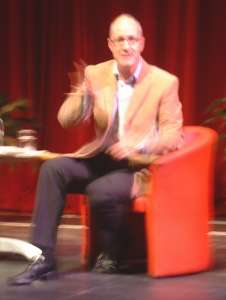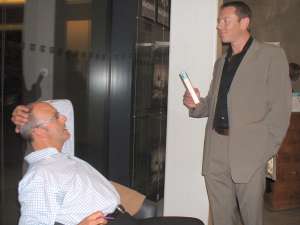
It takes a brave man to venture into what has been described as "the minefield of modern manners", but Simon Fanshawe plunged in regardless. A lesser man might have been deterred to find himself speaking solo where he had expected to find an ally, Michael Bywater having been confined to bed as a result of a fall. His confidence might have been dented by the discovery that his book The Done Thing would be only one of five books on manners all published at the same time: instead he took this as confirmation that there is "something in the Zeitgeist" which makes a book on this topic particularly timely.
A tall man, Simon Fanshawe folded himself into the small armchair provided, and, displaying an assurance and fluency which can presumably be attributed to his experience as a broadcaster, writer and Perrier Award winning comedian. He opened his talk with a cluster of the kind of jokes popular with after-dinner speakers: "I don't mind people looking at their watches; it's when they start tapping them to make sure they are still going...". In fact, with a very little help from Alison Lister, Festival organiser, whose rôle involved little more than fielding questions from the audience, it was nine o' clock before the audience realised that the evening had gone by.
They had been swept along by the blend of humour and passion which Simon Fanshawe brought to his subject. He began - as every serious campaign must - by defining his terms: manners are not the same thing as etiquette. Etiquette is a system of rules which decree, for example, which way the bottle of port should be passed around the table; yet behind these formalities is something real, the uniquely human habit of sharing food.
Unlike those who deprecate modern manners from the standpoint of the Daily Mail, Simon Fanshawe takes a broadly optimistic view of the modern world. He recognises that manners have declined as a result, in part, of the breakdown of communities in which everyone knew everyone else; in the past, children acting in an unmannerly way ran a serious risk of being seen and rebuked by an adult who recognised them. Now, people have much greater individual freedom, and this is a good and welcome thing: but a side-effect is that there is no generally accepted authority, no-one to arbitrate about the mannerly way to deal with such modern inventions as mobile phones.
 Yet he did not claim that his approach was an entirely modern one: on the contrary, he derived it from Desiderius Erasmus who published a handbook for children in 1530: De civilitate morum puerilium, a treatise of civil conduct for boys. Where earlier guides had described courtly behaviour, equating good manners with innate nobility, Erasmus took the more democratic view that good manners are a form of virtue, and can be learned. "My book is just an updating of Erasmus - a loose updating." said Simon Fanshawe, modestly - though he also claimed that he had toyed with the idea of giving it the very modern title Never Text a Condolence (amazingly, this piece of advice met with some resistance).
Yet he did not claim that his approach was an entirely modern one: on the contrary, he derived it from Desiderius Erasmus who published a handbook for children in 1530: De civilitate morum puerilium, a treatise of civil conduct for boys. Where earlier guides had described courtly behaviour, equating good manners with innate nobility, Erasmus took the more democratic view that good manners are a form of virtue, and can be learned. "My book is just an updating of Erasmus - a loose updating." said Simon Fanshawe, modestly - though he also claimed that he had toyed with the idea of giving it the very modern title Never Text a Condolence (amazingly, this piece of advice met with some resistance).
If there was a single message which emerged from the evening's talk, it was the surprisingly upbeat one that manners - as opposed to the arbitrary rules of etiquette - are in surprisingly good shape. Simon Fanshawe illustrated this by talking about two rituals which continue to function in the modern world: "Weddings and funerals," he claimed, "are brilliantly adapted." They work, in all their many forms, because we know what they are for. He also demonstrated his point by asking the audience if, in our allegedly unmannerly society, anyone had actually suffered rudeness in the course of the day - and if anyone had, they were not so ill-mannered as to say so.
 |
 |
| Previous report: Kissing the Wind |
Next Report: Short Stories |

